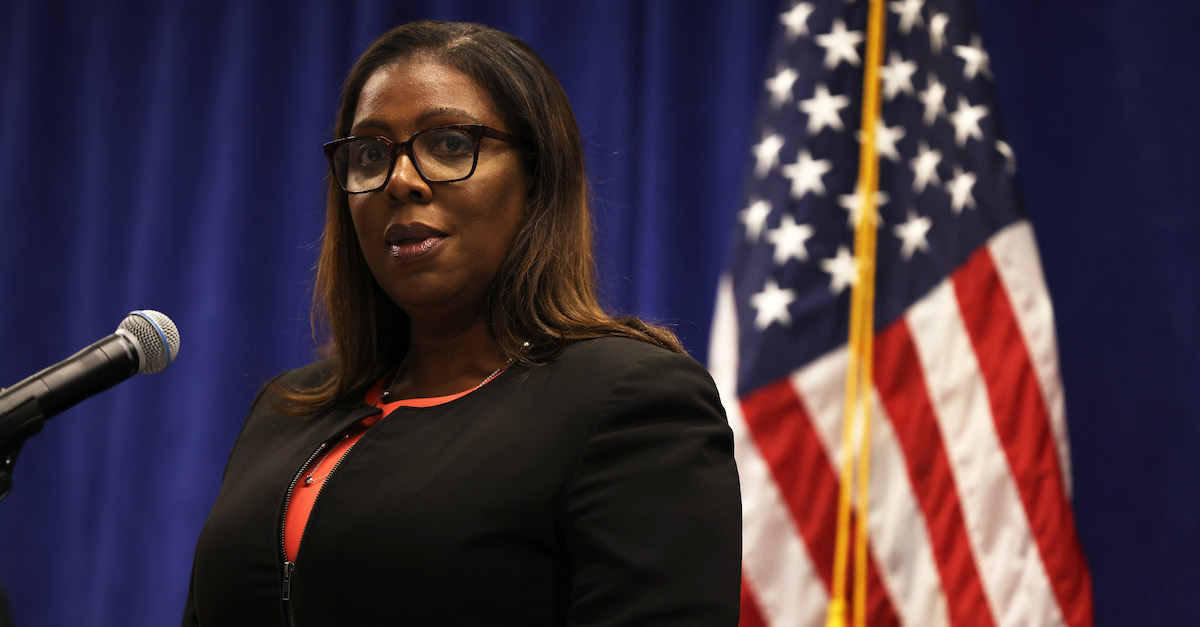
New York State Attorney General Letitia James speaks during a press conference on Aug. 6, 2020 announcing a lawsuit to dissolve the NRA.
New York Attorney General Letitia James (D) filed a motion in a federal appellate court on Monday in an effort to maintain a series of Empire State laws governing the licensing and carrying of handguns.
“The serious risk of irreparable harm to public safety and the possibility of regulatory chaos necessitates an immediate appeal,” the filing with the U.S. Court of Appeals for the Second Circuit reads. “As the data confirm, more guns carried in more places by more people result in more crime, violence, and homicide.”
The move comes after a federal district judge last week ruled broad swaths of recently-enacted gun control legislation, embodied in the Concealed Carry Improvement Act, constitutionally deficient.
James quickly promised to appeal the decision, insisting “the entire law must be preserved as enacted” in order to curtail gun violence.
The Democrat’s office responded to the ruling with a 36-page memorandum supporting a motion seeking a stay of the decision pending appeal, as well as an interim administrative, or emergency, stay of the “extraordinary temporary restraining order” issued by George W. Bush-appointed U.S. District Judge Glenn T. Suddaby.
“Today my office filed a motion to keep the entire Concealed Carry Improvement Act in effect and continue to protect communities as the appeals process moves forward,” James said in a statement provided to Law&Crime. “This common-sense gun control legislation is critical in our state’s effort to reduce gun violence. We will continue to fight for the safety of everyday New Yorkers.”
Legislators in Albany passed the suite of firearm regulations in July of this year after the conservative faction of the U.S. Supreme Court struck down New York’s longstanding gun control regime in June, significantly expanding the reach of the Second Amendment of the U.S. Constitution. Specifically, the 6-3 majority foun the section of New York’s gun-permitting statute which required an applicant to show a “special need for self-defense” unconstitutional.
On Oct. 6, 2022, Suddaby found that the state’s attempt to control handguns was not “consistent with this Nation’s historical tradition of firearm regulation,” chiding the CCIA for having “further entrenched” New York “as a shall-not-issue jurisdiction” and trampling over the right to self-defense with a handgun, which Justice Clarence Thomas staked out as a constitutional right in the major ruling stylized as New York State Rifle & Pistol Association, Inc. v. Bruen.
Suddaby stayed his own order for three days, which in the context of courts and law typically means business days, so the state could appeal – meaning the restraining order has yet to take effect.
Chief among the provisions pared down by the district court are so-called “Gun Free Zone[s]” in “sensitive places,” such as public transportation, museums, theaters, stadiums and libraries, public parks, zoos, shelters, places serving alcohol, and Times Square.
“[Suddaby’s] Order well exceeds the ordinary ‘purpose of a temporary restraining order,’ which ‘is to preserve an existing situation in statu quo [sic] until’ a more in-depth preliminary injunction ruling,” the AG’s Monday memo argues. “Here, the Order negates a statute that has already taken effect, forbidding defendants from enforcing, on a statewide basis, several of the CCIA’s critical post-Bruen updates governing who may carry a loaded handgun and where.”
The filing’s logic continues:
[T]he Order enjoins the State from enforcing prohibitions on carrying firearms in a variety of locations, increasing the chance that someone will a carry a loaded gun in a subway car, playground, library, fairground, public park, nightclub, or homeless shelter, among many other places. A shooting death (intentional or inadvertent) in any such area “could not be undone, thus rendering the consequences irreparable.”
The memo goes on to argue for the finer points of the new gun control package. The AG argues the section of the law mandating a review of a would-be licensed gun-toter’s recent social media accounts help to “identify potential instances of threatened harm to the public” and that the section mandating disclosure of children present in their household “implicates safe storage requirements.”
[image via Michael M. Santiago/Getty Images]